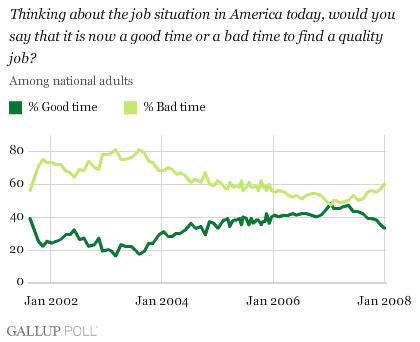PRINCETON, NJ - Federal Reserve Board Chairman Ben Bernanke testified before the House Budget Committee Thursday morning about the U.S. economic outlook and repeated the Fed's willingness to ease interest rates, which he signaled in a speech last week. He also supported the idea of an immediate short-term fiscal stimulus.
New federal stimulus efforts are likely to focus on increasing consumer spending this year in hopes of mitigating the impact of the current economic slowdown. Still, as the president and Congress design a fiscal stimulus plan, they should be mindful of last month's increase in the unemployment rate. Additional increases in the ranks of the unemployed seem likely given the results of a recent Ë┼├█┤ź├ŻPoll showing that the percentage of Americans who say now is a bad time to find a quality new job is at a two-year high.
Americans' Views on Finding a Quality New Job
A Ë┼├█┤ź├ŻPoll conducted Jan. 4-6, 2008, found 6 in 10 Americans saying now is a "bad time to find a quality job." This is up 13 percentage points from January 2007 and is the highest percentage since early December 2005, when 60% of Americans also held this view of the job market. Even so, it is well below the 81% who said it was a bad time to find a good job back in March and August 2003, during the buildup to and early stages of the war in Iraq.

Assessing the Fed's Potential for Impact
Fed policy is likely to be less effective in boosting the economy in the current low-interest-rate, consumer-credit-crunch environment than in many past economic downturns. Further, the Fed's actions tend to take considerable time to have any significant impact on the overall level of economic activity. Despite Bernanke's willingness to lower rates, monetary policy really can't stimulate consumer spending or prevent an increase in the unemployment rate as the economy slows in the months ahead.
Understanding this and the political pressure to take action during this presidential election year, it is not surprising that the Fed chairman supports the idea of a "well designed" federal fiscal stimulus plan. Nor should it be surprising that policymakers favor the idea of repeating the 2001 fiscal stimulus plan that involved sending checks directly to consumers -- not a bad idea politically in an election year. Lawmakers might be wise to also consider including something to help those who are at risk of joining the ranks of the unemployed.
While a short-term economic stimulus plan will not do much to address the many factors that have created the current economic slowdown, it will help mitigate the situation until after the election. At that point, perhaps a new post-election consensus can be reached to begin addressing some of the major factors affecting the U.S. consumer and the economy as a whole.
Survey Methods
Results are based on telephone interviews with 1,023 national adults, aged 18 and older, conducted Jan. 4-6, 2008. For results based on the total sample of national adults, one can say with 95% confidence that the margin of sampling error is ┬▒3 percentage points.
In addition to sampling error, question wording and practical difficulties in conducting surveys can introduce error or bias into the findings of public opinion polls.
